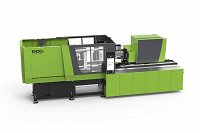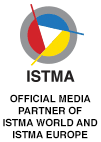ENGEL at Plástico Brasil 2019
28.02.2019
ENGEL is making its customers more competitive with reliable, flexible and efficient machines and automation from a single source. At Plástico Brasil 2019 from 25th to 29th March in São Paulo, Brazil, the injection moulding machine manufacturer and system expert headquartered in Austria will be demonstrating what this can look like in practice with two sophisticated applications from the fields of packaging and technical moulding. It will be clearly demonstrated how digitalisation, and machine and system networking can unlock even more efficiency and quality potential.
 Packaging: Thin-wall with IML in 2.2 seconds
Packaging: Thin-wall with IML in 2.2 seconds
Flexibility and high performance play the main roles in ENGEL's packaging exhibition space at Plástico Brasil 2019. An ENGEL e-motion 440/160 will be used to produce polypropylene ice cream cups using thin-wall technology in a 4-cavity mould with a total shot weight of 14.8 grams. Thanks to in-mould labelling (IML), the cups are ready-to-fill when they leave the integrated production cell. The cycle time is 2.2 seconds.
Two main factors are responsible for the high efficiency and economy of the production process. On the one hand, in-mould labelling makes it possible to change the decor without interrupting production. Even with very small batch sizes, this guarantees the lowest unit costs. On the other hand, ENGEL has consistently geared its all-electric ENGEL e-motion injection moulding machine for high-performance operation with injection speeds of more than 500 mm per second. The closed system for the toggle lever and spindle ensures optimum and clean lubrication of all moving machine components; the e-motion thus meets the strict purity requirements not only of the food industry, but also of the cosmetics, medical technology and pharmaceutical industries.
ENGEL is implementing this exhibit together with partners. The mould is provided by SIMON from Saint-Lupicin, France. BECK automation (Oberengstringen, Switzerland) is responsible for the IML automation. The labels come from Verstraete in Maldegem, Belgium, and the polypropylene from Borealis, who are headquartered in Vienna, Austria.
30 years of ENGEL tie-bar-less technology
Compact manufacturing cells, efficient automation and fast set-up processes: with their fully usable platen areas and free access to the mould area, tie-bar-less injection moulding machines fulfil the need for high efficiency and cost-effectiveness in production in a particularly good way. To mark the start of the 30th anniversary of ENGEL tie-bar-less technology, the machine manufacturer is presenting a tie-bar-less victory 1060/220 injection moulding machine at Plástico Brasil 2019, on which technical parts are produced in a multi-cavity mould. With its tie-bar-less technology, ENGEL still has a unique selling proposition today.
Barrier-free access to the mould area makes it possible to fully utilise the mould mounting platens up to the edges. This means that large, bulky moulds can be mounted on relatively small machines. This translates into efficiency factor, especially when multi-cavity moulds are used. Multi-cavity moulds, although large, require relatively little clamping force for the precise moulding of fairly small component surfaces. Where a tie-bar-less injection machine is deployed, therefore, the machine size is determined not by mould volume, but by the clamping force required for the moulding process. Thanks to tie-bar-less technology, much smaller injection moulding machines can be used for many applications; this keeps investment and operating costs low while facilitating compact manufacturing cells.
The patented force divider in the tie-bar-less clamping unit enables the moving mould mounting platen to follow the mould exactly parallel while clamping force is building up, and ensures that the applied force is evenly distributed across the whole surface. This means both outer and inner cavities are kept closed with precisely identical force, which leads to extremely consistent wall thicknesses. Even where very low viscosity materials such as liquid silicone rubber (LSR) are used, flash is reliably prevented.
Other advantages of tie-bar-less clamping units include improved ergonomics, mould set-up time savings and highly efficient automation concepts. The robots have maximum freedom of motion and unrestricted access to the mould area from the side, thus reducing the handling times. In São Paulo ENGEL is demonstrating this with a viper linear robot.
inject 4.0: compensating for process fluctuations before rejects are produced
A third topic for ENGEL at Plástico Brasil is inject 4.0. ENGEL already offers a range of mature products and solutions for the digitalisation and connectivity of manufacturing processes, and new ones are constantly being added. The modular approach of ENGEL's inject 4.0 program makes it particularly easy for processors to take advantage of the new opportunities that industry 4.0 opens up. Even small-scale individual solutions promise considerable benefits. As an example, ENGEL will be presenting its iQ weight control assistance system in São Paulo. During the injection process, the software analyses the pressure profile in real time and compares the measured values with a reference cycle. Individually for each shot, the injection profile, switchover point and the holding pressure profile are automatically adapted to current conditions and the injected melt volume is kept consistent throughout the whole production operation. In this way, fluctuations in environmental conditions and in raw materials are automatically recognised and readjusted before even a single reject is produced.


































